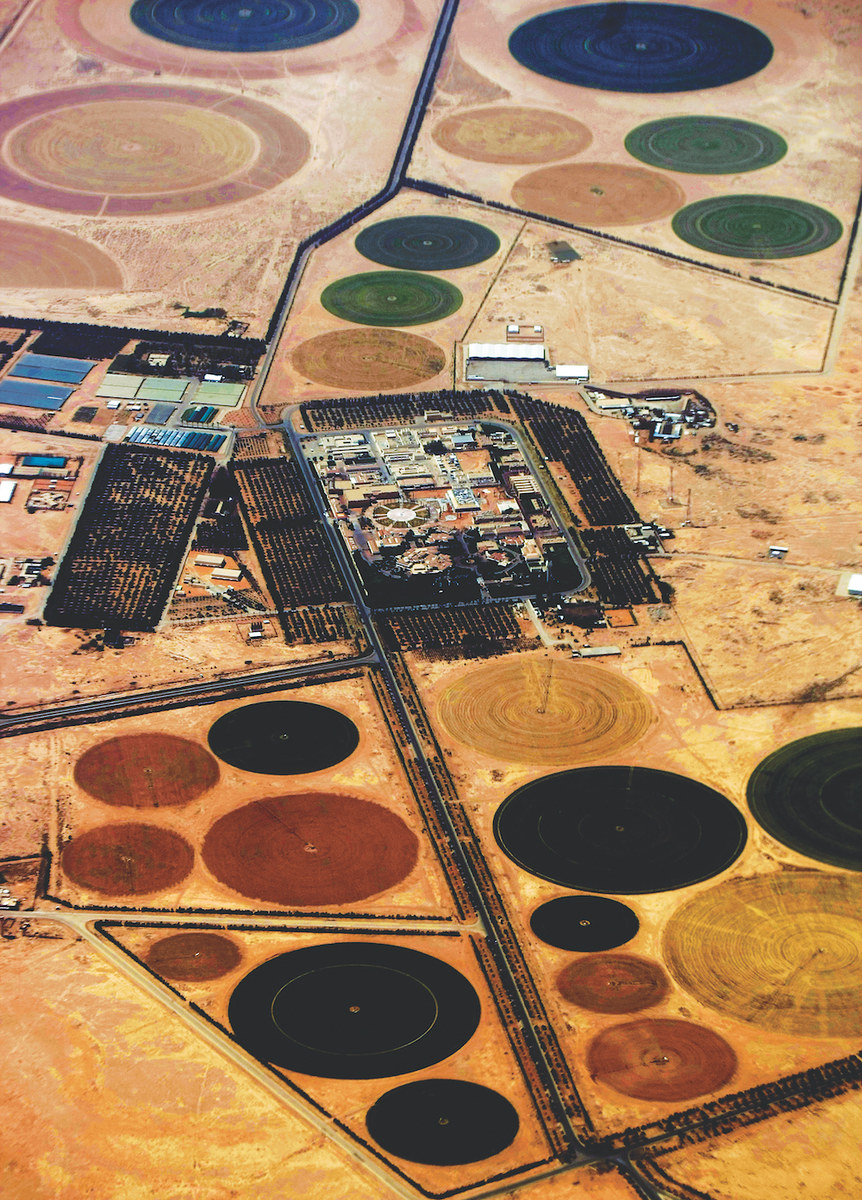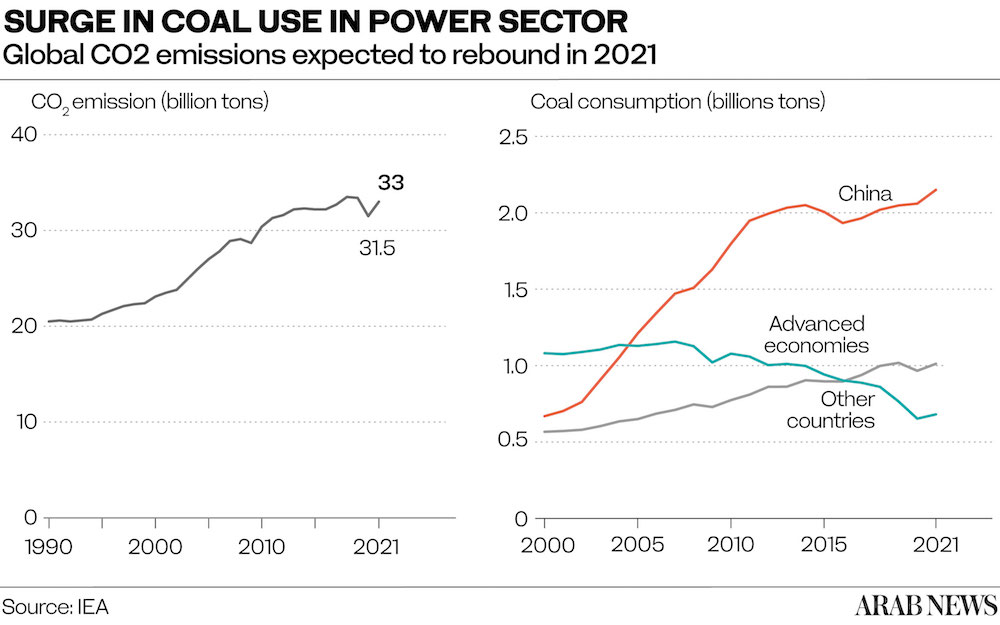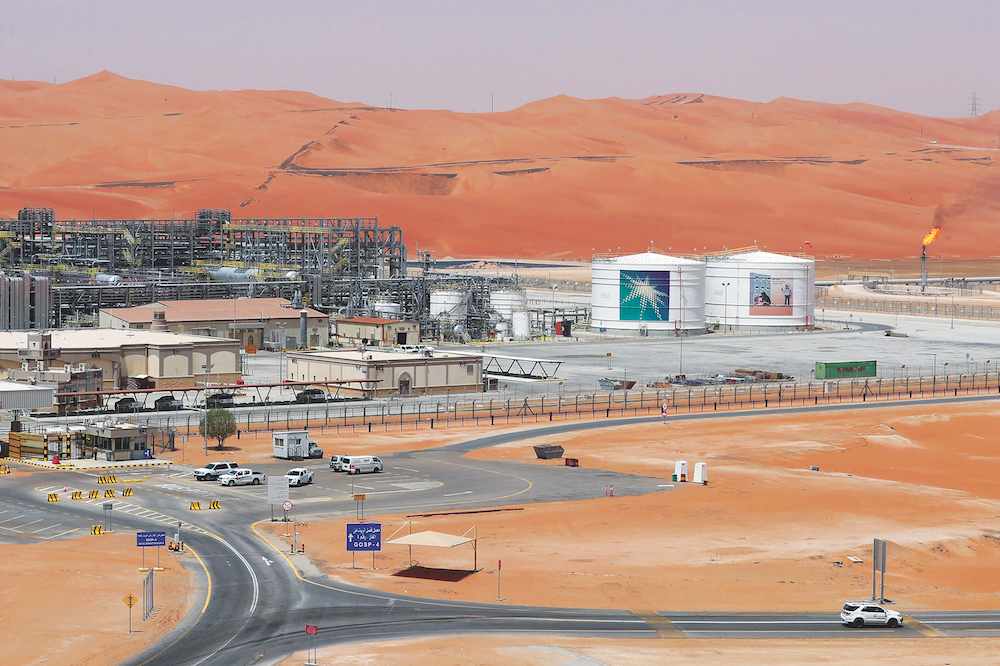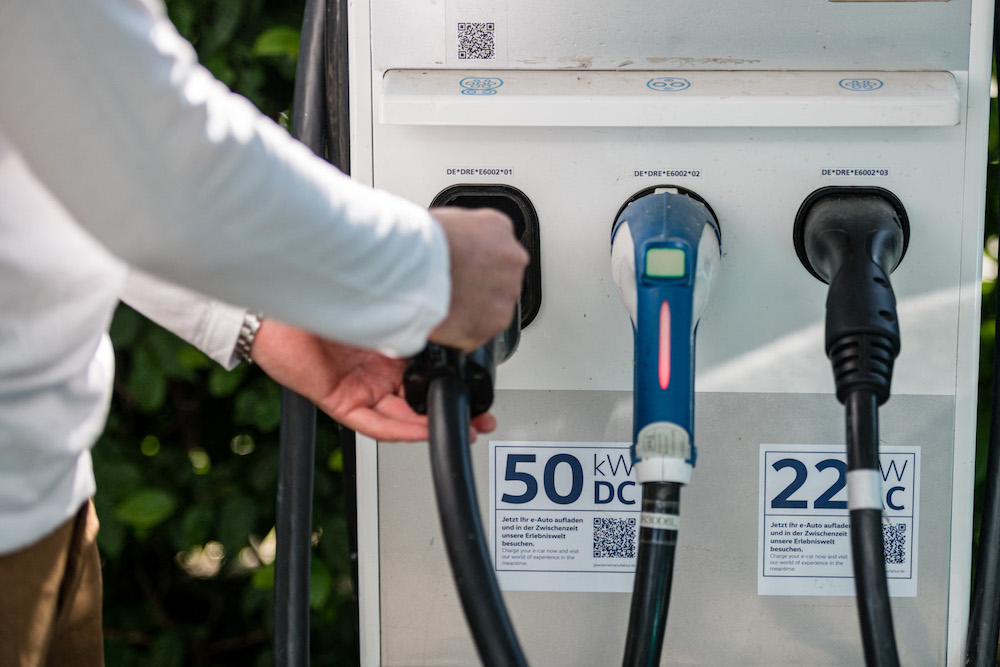[ad_1]
DUBAI: As Gulf Arab States step up actions to reduce greenhouse gas emissions ahead of COP26 climate summit in Glasgow in November, Saudi Arabia and United Arab Emirates have emerged as leaders regions in the transition to renewable energies and the decarbonization of the energy sector.
A recent report from the Atlantic Council, an American think tank, sheds light on actions taken by the two countries, while providing insight into the unique challenges each faces in the global energy transition.
The report comes as climatologists urge countries to drastically cut carbon emissions and transition from fossil fuels to clean, renewable energy in a bid to prevent global temperatures from rising further.
Gulf Cooperation Council (GCC) states have accelerated measures to reduce greenhouse gas emissions, including adopting renewable energies and methods to remove carbon from the atmosphere, as well as ‘attacking their economic dependence on the export of hydrocarbon-based products.
According to the Atlantic Council report released last month, global energy demand from traditional renewable energy sources, including wind, solar, geothermal, tidal and hydro, has increased by more than 70% in absolute terms. since 2000.
But with rapid population growth and accelerating economic activity, the report warns that there will likely be a lag in the penetration rate of new technologies designed to offset additional emissions.
The report, titled “The Energy Transition in the Arab Gulf: From Vision to Reality,†and authored by Jean-François Seznec and Samer Mosis, said that there is enormous potential for solar power in the region. Gulf.
Indeed, Saudi Arabia and the United Arab Emirates rank among the top 15 countries in the world in terms of practical PV power potential. Studies have shown that the average annual solar radiation in GCC countries is equal to 1.1 barrels of oil equivalent per square meter.
The report’s authors praise the Kingdom’s adoption of the Circular Carbon Economy Platform, or CCE, which provides a comprehensive strategy for Saudi Arabia’s approach to energy transition.

They recommend creating a unified vision for decarbonization and, for good measure, centralized and transparent planning in the shift to cleaner energy and economic activity.
CCE is a closed-loop energy strategy designed to promote the reduction, reuse and recycling of carbon products and even their disposal with the goal of removing harmful pollutants from the atmosphere.
Energy ministers from the group of major economies of the G20 endorsed Saudi Arabia’s CTE approach to managing greenhouse gas emissions last year when the Kingdom held the presidency of the G20.
In partnership with Saudi Aramco, the Kingdom has made energy efficiency and the minimization of flaring of its oil fields top priorities to mitigate climate change, as well as the reduction of fossil fuels through the substitution of energy sources. low carbon emissions such as renewables, hydropower, nuclear and bioenergy. .
Seznec, one of the report’s authors and a non-resident lead researcher at the Atlantic Council Global Energy Center, praises Saudi Aramco’s efforts to capture carbon and describes the main challenge of the transition as organizational.
“I am a big fan of it and how it is handled,” Seznec told Arab News. “But their point of view is that in order to have a proper transition and a carbon-free economy, you have to use the assets they have, namely carbon and oil, and decarbonize them.

“The capture of the CO2, which comes out of the oil when it is burned, is then re-injected underground, and part of it has been done with medium-sized factories.
Using this type of technology, CO2 can be captured in the air and stored in the soil, or reused for useful products, such as fuels, bioenergy, chemicals, building materials, food and fuel. drinks. It can also be chemically transformed into new products such as fertilizers and cement, or other forms of energy such as synthetic fuels.
Methods such as those involving Carbon Capture, Use and Storage, or CCUS, technologies are seen as a potential shift in the world’s efforts to rapidly reduce CO2 emissions.
In its latest report released in August this year, the UN Intergovernmental Panel on Climate Change warned that without the widespread adoption of CCUS technologies, long-term global climate goals may be impossible to achieve. to reach.
But because the type of factories used by Aramco are expensive, only a handful have been built in the world. Aramco is developing further, which could make these technologies more and more attractive to other countries.
Nonetheless, “from the point of view of oil producers, such as the Abu Dhabi National Oil Company and Aramco, it is very important to keep producing, keeping the value of the asset in the ground,” Seznec added. .

According to the report, although Aramco is at the forefront of the Kingdom’s work on the CCE, he is not the only big player. Seznec argues that it makes sense to have a more centralized approach.
“In Saudi Arabia, this means the support of the country’s leaders for Saudi Aramco and SABIC technologies in CCUS, the transformation of crude into chemicals and the circular carbon economy,” the report said. “For the UAE, that means staying the course with ADPower and ensuring it has the bandwidth to extend its expertise to larger portions of ADQ.”
New technologies are expected to play a central role in reducing CO2 emissions around the world and in the Gulf’s economic energy transition in the future. For Seznec, decarbonization will best serve the Kingdom and the UAE as they develop technologies to improve the process and sell it to the rest of the world.
“I strongly suggest that the Gulf countries make an effort to control and develop the technology themselves, just like they have done with chemicals, because once they do, then they can earn money. money on technology and new sources of energy, â€he said. .
“It is very important that it is centralized and developed very actively on both sides. It should happen as quickly as possible, and it can only happen if what is effective is pushed first.

The development of CCUS technologies could provide countries in the region with another potentially valuable export line, Seznec said. But the future is in the hands of inventors and engineers.
“Saudi Arabia has done this superbly in many other areas in the past, so I have no fear that they may not be able to do it in the future,†Seznec said. “The development of technology is really what needs to be centralized and the tech experts need to be empowered to do what they need to do to get there.”
Means of achieving this include strengthening the private sector through investment, in addition to government investment in public enterprises.
Saudi Arabia and the United Arab Emirates were urged in the report to limit the extent to which private companies can be taken over by state entities, while actively helping their respective private sectors to acquire foreign technology companies, by granting the priority to the transfer of knowledge and skills.

We will also have to invest in education. The report urged the two countries to help existing universities and state entities, such as Aramco and SABIC, to research and commercialize locally developed technologies.
“The two countries should set a goal of making CCUS commercially viable, emphasizing local content requirements in all renewable energy and circular carbon economy projects, much like Saudi Aramco has said. done with the In-Kingdom Total Value Add (iktva) program, â€the report says.
He also urged the Kingdom and the United Arab Emirates to “encourage national oil companies, such as ADNOC and Saudi Aramco, to meet the targets set by many international oil companies to reach zero net emissions by a target date.”
————–
Twitter: @CalineMalek
[ad_2]

